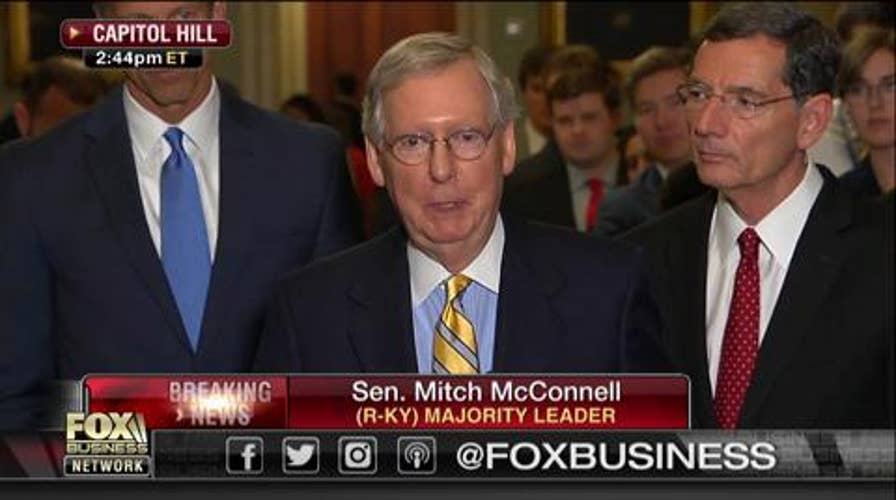McConnell on health care: It’s complicated but we’ll get there
Sen. Mitch McConnell (R-Ky.) says although health care is a complicated subject he’s optimistic on passing reform.
Senate Majority Leader Mitch McConnell is rejecting President Trump's suggestion on how the Senate could promptly pass its ObamaCare overhaul measure -- by immediately repealing the 2010 heath care law and replacing it later.
The Kentucky Republican said Friday night that the bill, which includes significant and complex changes to ObamaCare, remains challenging but "we are going to stick with that path."
He also riffed on Trump’s winning campaign slogan, saying, "It's not easy making America great again, is it?"
McConnell, the leader of GOP-controlled Senate, responded to Trump tweeting earlier in the day: “If Republican Senators are unable to pass what they are working on now, they should immediately REPEAL, and then REPLACE at a later date!”
Trump is trying to revive an approach that GOP leaders and the president himself considered but dismissed months ago as impractical and politically unwise.
The Senate introduced its bill about two weeks ago but left Washington for July 4 recess without enough support from the chamber’s 52 GOP senators to pass the measure. McConnell will need support from at least 50 of them because the bill has no support among Senate Democrats.
The GOP-controlled House passed its ObamaCare overhaul bill earlier this month.
McConnell's is struggling to bridge the divide between moderates and conservatives.
The president also tweeted his message shortly after Nebraska Republican Sen. Ben Sasse appeared on Fox News Channel's "Fox & Friends" to talk about a letter he had sent to Trump making that exact suggestion: a vote on repealing former President Barack Obama's health law followed by a new effort at a working out a replacement.
Trump is a known "Fox & Friends" viewer, but Sen. Rand Paul, R-Ky., also claimed credit for recommending the tactic to the president in a conversation earlier in the week.
"Sen. Rand Paul suggested this very idea to the president," said Paul spokesman Sergio Gor. "The senator fully agrees that we must immediately repeal Obamacare and then work on replacing it right away."
Either way, Trump's suggestion has the potential to harden divisions within the GOP as conservatives like Paul and Sasse complain that McConnell's bill does not go far enough in repealing former President Barack Obama's health care law while moderates criticize it as overly harsh in kicking people off insurance rolls, shrinking the Medicaid safety net and increasing premiums for older Americans.
McConnell has been trying to strike deals with members of both factions in order to finalize a rewritten bill lawmakers can vote on when they return to the Capitol the second week of July.
Even before Trump was inaugurated in January, Republicans had debated and ultimately discarded the idea of repealing the overhaul before replacing it, concluding that both must happen simultaneously. Doing otherwise would invite accusations that Republicans were simply tossing people off coverage and would roil insurance markets by raising the question of whether, when and how Congress might replace Obama's law once it was gone.
The idea also would leave unresolved the quandary lawmakers are struggling with now, about how to replace Obama's system of online insurance markets, tax subsidies and an expanded Medicaid with something that could get enough Republican votes to pass Congress. House Republicans barely passed their version of a replacement bill in May, and the task is proving even tougher in the Senate, where McConnell has almost no margin for error.
Moderates were spooked as the week began with a Congressional Budget Office finding that McConnell's draft bill would result in 22 million people losing insurance over the next decade, only 1 million fewer than under the House-passed legislation which Trump privately told senators was "mean." But conservatives continue to insist that the bill must go further than just repealing some of the mandates and taxes in Obama's law.
Underscoring the fissures within the GOP, conservative group leaders on that call welcomed Trump's suggestion but said it didn't go far enough because it could open the door to a subsequent bipartisan compromise to replace Obama's law. At the same time, a key House Republican, Rep. Kevin Brady, chairman of the House Ways and Means Committee, rejected Trump's suggestion, contending that it "doesn't achieve what President Trump set out to do."
The Associated Press contributed to this story.













































